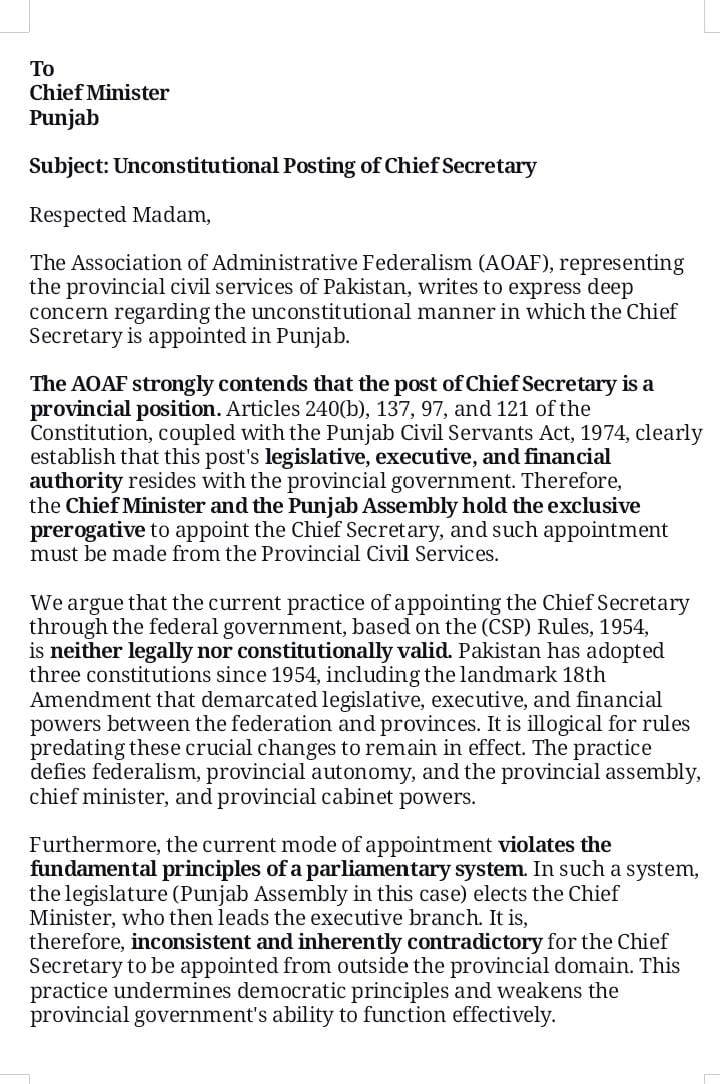Noman Wazir
AOAF has written a letter to newly elected chief minister of Punjab to exercise her constitutional and legal authority and appoint the chief secretary from the provincial civil services as per law and constitution. The Excerpts of the the letter as as follows:
The Association of Administrative Federalism (AOAF), representing the provincial civil services of Pakistan, writes to express deep concern regarding the unconstitutional manner in which the Chief Secretary is appointed in Punjab.
The AOAF strongly contends that the post of Chief Secretary is a provincial position. Articles 240(b), 137, 97, and 121 of the Constitution, coupled with the Punjab Civil Servants Act, 1974, clearly establish that this post’s legislative, executive, and financial authority resides with the provincial government. Therefore, the Chief Minister and the Punjab Assembly hold the exclusive prerogative to appoint the Chief Secretary, and such appointment must be made from the Provincial Civil Services.
We argue that the current practice of appointing the Chief Secretary through the federal government, based on the (CSP) Rules, 1954, is neither legally nor constitutionally valid. Pakistan has adopted three constitutions since 1954, including the landmark 18th Amendment that demarcated legislative, executive, and financial powers between the federation and provinces. It is illogical for rules predating these crucial changes to remain in effect. The practice defies federalism, provincial autonomy, and the provincial assembly, chief minister, and provincial cabinet powers.
Furthermore, the current mode of appointment violates the fundamental principles of a parliamentary system. In such a system, the legislature (Punjab Assembly in this case) elects the Chief Minister, who then leads the executive branch. It is, therefore, inconsistent and inherently contradictory for the Chief Secretary to be appointed from outside the provincial domain. This practice undermines democratic principles and weakens the provincial government’s ability to function effectively.
The existing system also creates a situation where the Chief Secretary operates outside the purview of provincial laws and the Chief Minister’s authority. This lack of accountability poses a significant challenge to ensuring proper administrative conduct and performance.
It is important to note that the role of Chief Secretary was instituted during the colonial era when provinces lacked elected representatives. In a democratic Pakistan, the need for such an office is questionable.
Therefore, we request the formation of a legal committee to thoroughly examine the legal and constitutional validity of the current appointment process for the Chief Secretary.
We also request your good honor to exercise your lawful and constitutional authority to appoint the Chief Secretary from the Provincial Civil Services, upholding the principles of federalism and ensuring compliance with the Constitution.
We believe rectifying this constitutional anomaly is crucial for strengthening the provincial government and promoting a robust federal structure in Pakistan. It will also empower the chief minister, provincial assembly, and cabinet to implement the provincial powers as per law and Constitution.
Lastly, AOAF will also give constitutional, legal, and administrative representation if needed.
Accordingly, it is the fundamental issue of the federalism and governance in Pakistan and political executives of the provinces must investigate it and also implement the constitution. Pakistan is a federation but the structure of bureaucracy is unitary. Therefore, there is a need to constitutionalize it.
Please, subscribe to the YouTube channel of republicpolicy.com
















